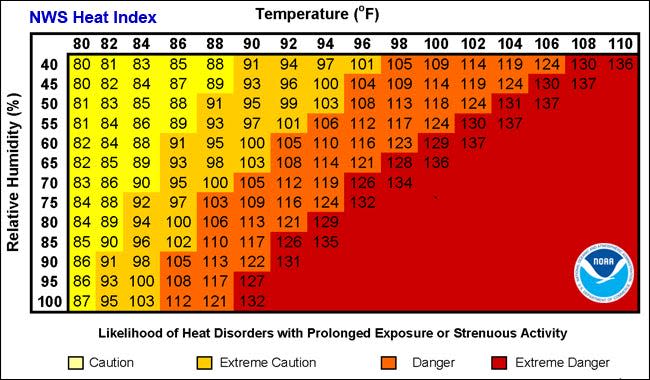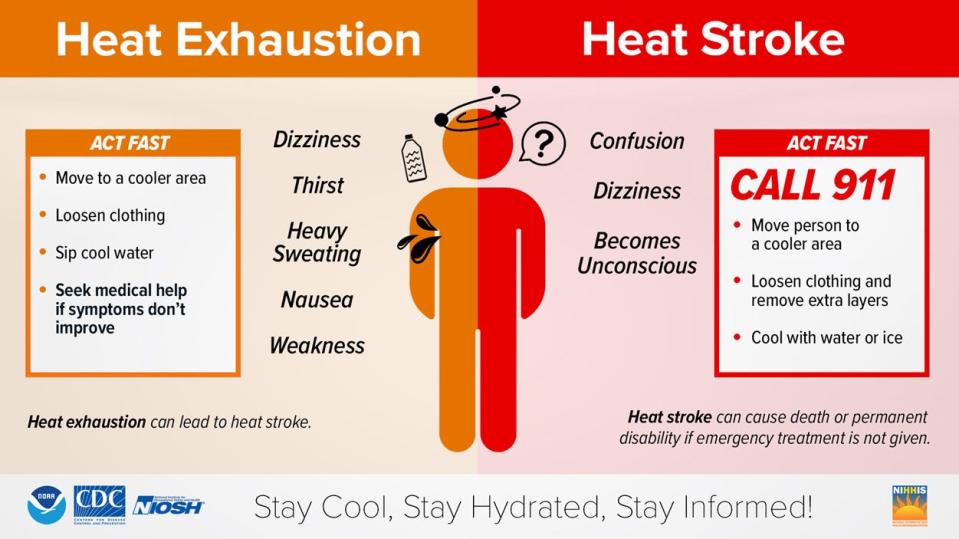Heat wave brings excessive heat watch to Delaware. Here's the heat index
The first heat wave of the year is hitting Delaware today, and it could be more dangerous because of how early it is in the year.
New Castle County is under a heat advisory starting Tuesday and running through 6 a.m. Thursday. The county then moves into an excessive heat watch through the weekend.
The early season heat wave is dangerous because people's bodies haven't acclimated to the heat.
"Heat is interesting because it's not just meteorology," Sarah Johnson, a meteorologist at the National Weather Service office in Mount Holly, New Jersey, said. "A severe thunderstorm is a severe thunderstorm, but with heat, there is the factor of acclimation. ... There are more emergency room visits in June versus August with the same temperatures because of the acclimation factor."

The forecast for Tuesday is calling for temperatures in the 90s with 79% humidity. That would put the heat index values up to 105 degrees. A heat advisory is issued within 12 hours of extreme heat conditions. Typically, the heat index will be above 100 degrees and the nighttime air temperature will not drop below 75 degrees.
The forecast for Wednesday is identical with highs in the low 90s and high levels of humidity.
After Wednesday, the conditions worsen as New Castle County moves into an excessive heat watch on Thursday, which will last through Sunday. The weekend forecast is calling for heat index values up to 96 degrees.
According to the National Weather Service, temperatures will continue to rise late in the week, with the highest temperatures coming Friday.
While temperatures will recede a little over the weekend, surface dew points will rise, increasing humidity and making it feel much hotter.
A prolonged period of heat and increasing humidity will continue to build this week and into this weekend.
Heat Advisories are now in effect for today and Wednesday.
The Excessive Heat Watch has been extended into Sunday.https://t.co/BVdKD6JKjt#NJwx #PAwx #DEwx #MDwx pic.twitter.com/GUisOW79tM— NWS Mount Holly (@NWS_MountHolly) June 18, 2024
Delaware weather forecast
While the heat advisory and excessive heat watch do not extend south of New Castle County, it doesn't mean the rest of the state isn't dealing with higher-than-normal temperatures.
Kent County forecast: Temperatures will be in the upper-80s with high humidity Tuesday through Thursday. Over the weekend, highs will reach the lower 90s with humid conditions.
Sussex County forecast: Temperatures in Sussex County will be in the low 90s with humid conditions Tuesday through Thursday. Over the weekend, highs will reach the upper 90s with humid conditions.
"We're not expecting (excessive heat) warning criteria, but we may be getting to advisory criteria," Johnson said. "It's still going to be hot, just not as hot as Wilmington. They'll get a small break."
How to stay cool in a heat wave
With the extreme temperatures, here are some ways to stay safe.
Drink plenty of fluids.
Stay in an air-conditioned room.
Stay out of the sun.
Check up on relatives and neighbors.
Take extra precautions when outside.
Wear lightweight and loose-fitting clothing.
Try to limit strenuous activities to early morning or evening.
Take action when you see symptoms of heat exhaustion and heat stroke.
What are heat-related illnesses?

During extremely hot and humid weather, the body is challenged to cool itself. When the body struggles too much, several heat-related illnesses can occur. According to the National Weather Service, here's what to watch for:
Heat cramps: Heat cramps are the first sign of heat-related illnesses. The symptoms include muscle cramps and spasms typically in the legs or abdomen. You should apply pressure on the cramping muscle or gently massage the muscle. The person should also try to sip water unless they are nauseous. If the cramps last more than an hour, the person should seek medical attention.
Heat exhaustion: A person who has heat exhaustion will sweat heavily, be tired, cool and clammy, have a weak, fast pulse, have muscle cramps, dizziness, nausea, headaches and may faint. Move the person to a cool area, loosen clothes and apply cool wet clothes or have the person sit in a bath. Offer water. If a person vomits more than once or symptoms worsen, seek immediate medical attention.
Heat stroke: The symptoms of heat stroke include a body temperature above 103 degrees, a throbbing headache, confusion, nausea, fainting or a loss of consciousness. Call 911 or get the person to a hospital immediately.
Who is most vulnerable in the heat?
According to the National Weather Service, heat is among the leading weather-related killers. These are the groups most impacted by high temperatures:
Young children and infants are particularly vulnerable to heat-related illness and death, as their bodies are less able to adapt to heat than are adults.
Older adults, particularly those with preexisting diseases, take certain medications, are living alone or with limited mobility and are exposed to extreme heat can experience multiple adverse effects.
People with chronic medical conditions are more likely to have serious health problems during a heat wave than healthy people.
Pregnant women are also at higher risk. Extreme heat events have been associated with adverse birth outcomes such as low birth weight, preterm birth, and infant mortality, as well as congenital cataracts.
How to help pets during a heat wave
When heat waves hit, dogs are also susceptible to heat stress and head strokes, according to the American Kennel Club.
Heat stress: Heat stress in dogs occurs when a dog's resting temperature hits 104 degrees. The signs and symptoms of heat stress include a dog looking for shade, limiting its movements, choosing to sit or lie down, panting, vomiting and excessive saliva.
Heat stroke: This condition occurs when your dog's resting body temperature exceeds 106 degrees. The symptoms include the dog acting confused; excessive drooling and thickening saliva; gums being bright red, blue or purple; refusing to drink water; losing consciousness; or having seizures. Immediate veterinary attention is required.
This article originally appeared on Delaware News Journal: Heat wave causes excessive heat watch in Delaware this week

